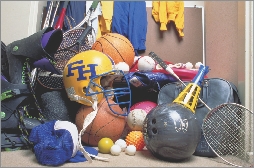1 TRY OUT LANGUAGE
2 LEARN GRAMMAR
3 APPLY ON YOUR OWN
Use Compound Sentences
• A clause contains a subject and a verb. An independent clause contains a subject and a verb and can stand alone as a sentence.
EXAMPLES My uncle is a soccer coach. independent clause He teaches young players. independent clause • A compound sentence contains at least two independent clauses joined by and, but, or or.
• The words and, but, and or are conjunctions. They join two independent clauses to form a compound sentence. A comma (,) always comes before the conjunction.
EXAMPLE My uncle is a teacher, independent clause and he is a soccer coach. independent clause Conjunction Independent Clauses Compound Sentence Use and to join similar ideas. I went to the corner. I waited for the bus. I went to the corner, and I waited for the bus. Use but to join different ideas. I arrived a bit late.The game had not begun. I arrived a bit late, but the game had not begun. Use or to show a choice. I could watch from the sidelines. I could watch from the stands. I could watch from the sidelines, or I could watch from the stands.
Practice Together
Say each pair of sentences. Choose and, but, or or to combine them. Say each new compound sentence, and add the correct word.
1. My uncle is a great role model. He is a hero to many.
2. A sport can bring people together. It can also cause problems.
3. You can be an ordinary coach. You can be like my uncle.

We collect sports equipment, and we give it to teams in need.
Try It!
Say each pair of sentences. Choose and, but, or or to combine them and write it on a card. Write each compound sentence. Include the comma.
4. Last year, we collected old uniforms. We’ll collect again this year.
5. Some of my friends helped last year. This is my first year helping.
6. We could collect toys next year. We could collect sports equipment.